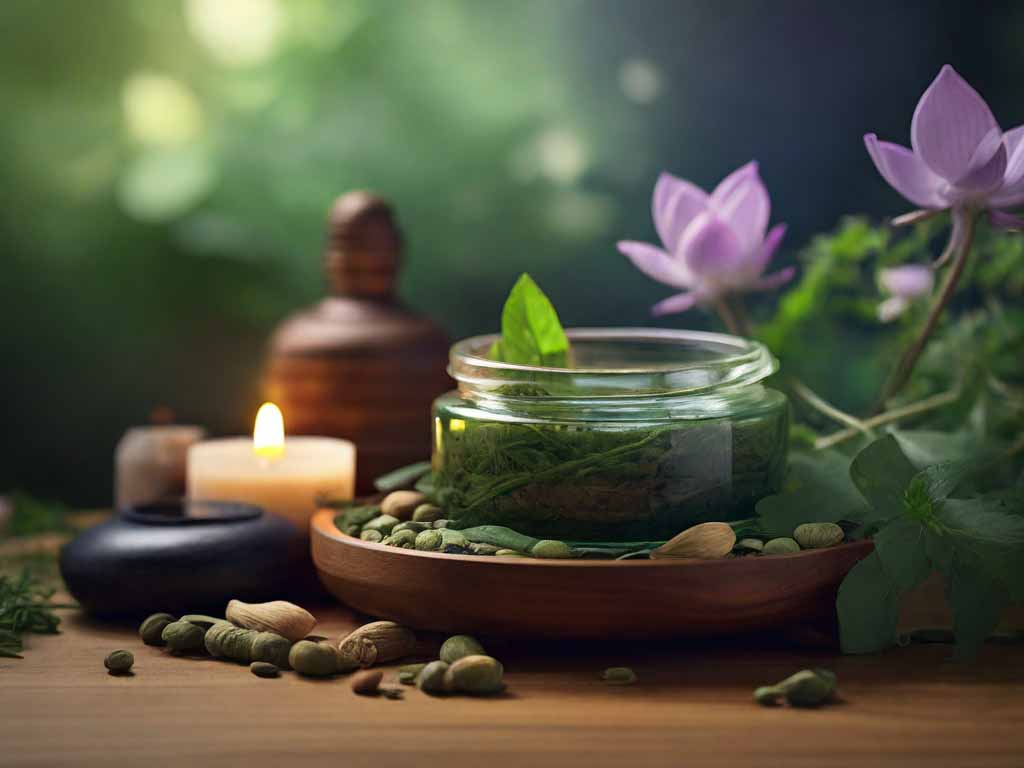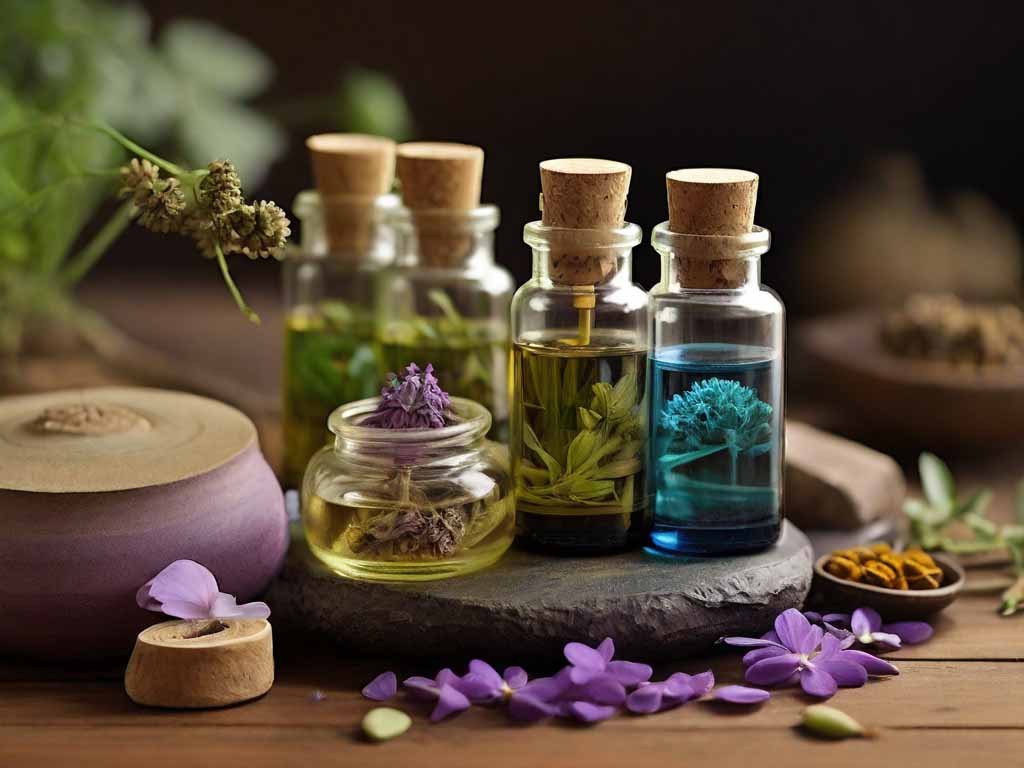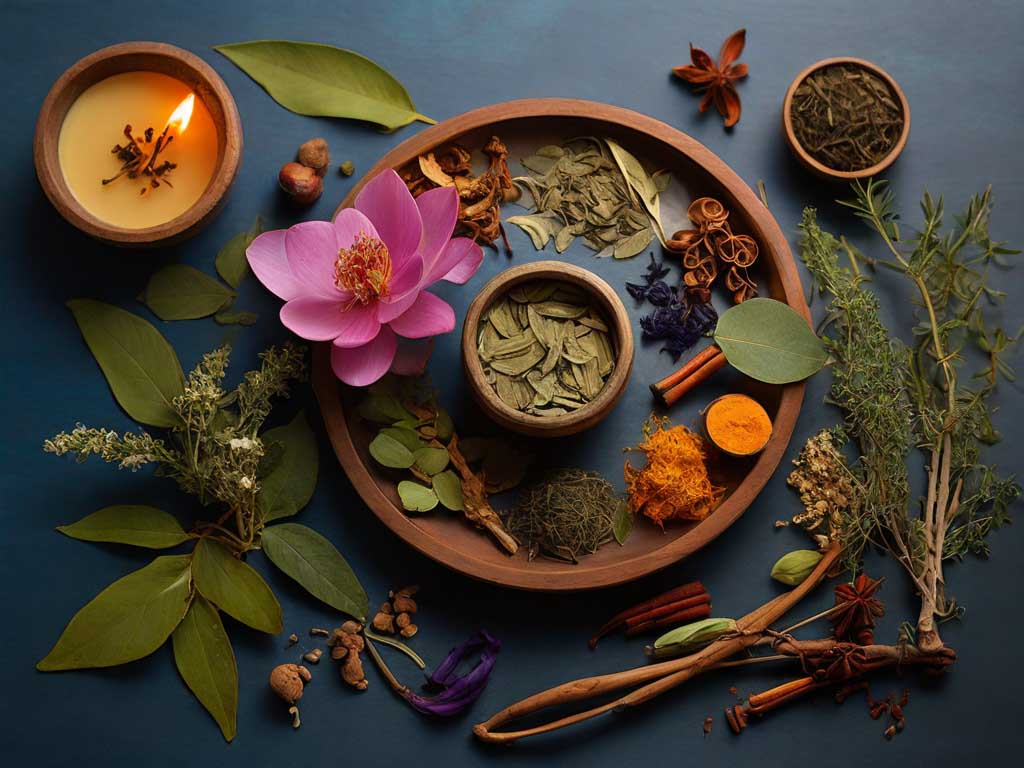
“Serenity Unveiled: 4 Ayurvedic Remedies for Restful Sleep and Insomnia Relief”
Prelude:
In the realm of Ayurveda, the significance of restful sleep transcends mere rejuvenation; it is a cornerstone of overall well-being. This comprehensive Ayurvedic Remedies for Restful Sleep guide delves into the wisdom of Ayurvedic remedies, exploring herbs that not only support deep and restorative sleep but also offer relief to those grappling with insomnia. As we navigate the principles of Ayurveda, the guide illuminates the holistic approach to sleep, unveiling the intricate balance within the body and mind that fosters serenity.
Understanding Sleep in Ayurveda:
Ayurveda perceives sleep as a vital pillar of health, influencing physical, mental, and emotional equilibrium. The guide initiates by unravelling Ayurvedic perspectives on sleep cycles, circadian rhythms, and the dynamic interplay of doshas—Vata, Pitta, and Kapha—in influencing sleep patterns.
Ashwagandha: The Tranquilizer
Ashwagandha, known as “The Tranquilizer” in Ayurveda, is a potent adaptogenic herb renowned for its profound ability to alleviate stress, anxiety, and insomnia. Its scientific name, Withania somnifera, underscores its traditional use as a sleep aid. Ashwagandha’s adaptogenic nature means it helps the body adapt to stressors, modulating the stress response and promoting a sense of calm.
This herb contains bioactive compounds, including withanolides, that exert anxiolytic effects, reducing the impact of stress on the nervous system. By calming the mind and supporting neurotransmitter function, Ashwagandha creates an environment conducive as Ayurvedic Remedies for Restful Sleep.
DIY Recipe: Ashwagandha Sleep Tonic
Ingredients:
- 1 teaspoon Ashwagandha powder
- 1/2 teaspoon nutmeg powder
- 1 cup warm milk
- Honey for sweetness (optional)
Instructions:
- Mix Ashwagandha powder and nutmeg powder in a cup.
- Heat the milk until warm but not boiling.
- Pour the warm milk over the powder mixture.
- Stir well and add honey for sweetness, if desired.
Consume this Ashwagandha Sleep Tonic about 30 minutes before bedtime. The warm milk enhances the calming effects of Ashwagandha, promoting relaxation and preparing the mind and body for a restful night’s sleep.
Incorporating Ashwagandha into your nightly routine not only helps in managing stress and anxiety but also contributes to a tranquil mind, fostering an environment for quality sleep. Embrace the tranquility of Ashwagandha as a natural and holistic approach to addressing sleep-related concerns.
Brahmi: Nurturing Neurotransmission
Brahmi, known as the “Nurturer of Neurotransmission” in Ayurveda, is a revered herb celebrated for its remarkable impact on the nervous system. Scientifically called Bacopa monnieri, Brahmi has been cherished for centuries for its neuroprotective properties, which extend beyond cognitive benefits to include positive effects on sleep quality.
The active compounds in Brahmi, known as bacosides, play a pivotal role in nourishing and supporting neurotransmitter function. Neurotransmitters are chemical messengers that facilitate communication between nerve cells, influencing various physiological processes, including those related to sleep regulation. Brahmi’s ability to enhance neurotransmission contributes to improved signaling within the nervous system, promoting a state of calm conducive to quality sleep.
DIY Recipe: Brahmi-infused Sleep Elixir
Ingredients:
- 1 tablespoon dried Brahmi leaves
- 1 cup hot water
- 1 teaspoon raw honey (optional)
Instructions:
- Place dried Brahmi leaves in a cup.
- Pour hot water over the leaves and let it steep for 10-15 minutes.
- Strain the infusion to remove the leaves.
- Add honey if desired for flavour.
Sip on this Brahmi-infused Sleep Elixir about an hour before bedtime. The calming and neuroprotective properties of Brahmi create a soothing effect on the nervous system, fostering a tranquil state of mind that supports restful sleep.
Incorporating Brahmi into your evening routine not only nurtures neurotransmission but also provides a holistic approach as a Ayurvedic Remedies for Restful Sleep support. Embrace the nourishing essence of Brahmi for enhanced sleep quality and overall well-being.
Top of Form
Jatamansi: The Sedative Soother
Jatamansi, celebrated as “The Sedative Soother” in Ayurveda, is a cherished herb known for its natural sedative properties, making it a valuable ally in the quest for restful sleep. Scientifically known as Nardostachys jatamansi, this herb has been traditionally used for its calming effects on the nervous system, contributing to a sense of tranquility and aiding in the combat against insomnia.
At the heart of Jatamansi’s efficacy lies its bioactive compounds, including valerianic acid, which exhibits sedative and anxiolytic effects. These compounds work synergistically to pacify the nervous system, reducing restlessness and calming the mind. Jatamansi’s ability to modulate neurotransmitters such as gamma-aminobutyric acid (GABA) plays a crucial role in promoting relaxation and preparing the body for restorative sleep.
DIY Recipe: Jatamansi Relaxation Infusion
Ingredients:
- 1 tablespoon dried Jatamansi root
- 1 cup hot water
- 1 teaspoon raw honey (optional)
Instructions:
- Place dried Jatamansi root in a cup.
- Pour hot water over the root and let it steep for 15-20 minutes.
- Strain the infusion to remove the root.
- Add honey if desired for flavour.
Sip on this Jatamansi Relaxation Infusion about 30 minutes before bedtime. The calming properties of Jatamansi work harmoniously with the nervous system, promoting a tranquil state that facilitates the onset of sleep and supports its depth.
Incorporating Jatamansi into your night-time routine provides a natural and holistic approach to addressing sleep concerns. Embrace the sedative soothing qualities of Jatamansi for a restful and rejuvenating night’s sleep with this Ayurvedic Remedies for Restful Sleep.
Tulsi: The Stress-Busting Elixir
Tulsi, also known as Holy Basil, stands as “The Stress-Busting Elixir” in Ayurveda, offering a holistic remedy for stress-related concerns and promoting a tranquil state of mind conducive to uninterrupted sleep. With its adaptogenic nature, Tulsi has been revered for centuries for its ability to help the body adapt to stressors and foster relaxation.
The adaptogenic properties of Tulsi are attributed to its bioactive compounds, including eugenol and ocimarin. These compounds play a pivotal role in modulating the body’s stress response, balancing cortisol levels, and promoting a sense of calm. Tulsi’s influence extends beyond mere relaxation; it contributes to overall mental well-being, creating an environment conducive to restful sleep.
DIY Recipe: Tulsi Sleep Infusion
Ingredients:
- 1 tablespoon fresh Tulsi leaves (or 1 teaspoon dried Tulsi)
- 1 cup hot water
- 1 teaspoon raw honey (optional)
Instructions:
- Wash and bruise the fresh Tulsi leaves or use dried Tulsi.
- Place the Tulsi leaves in a cup and add hot water.
- Allow the leaves to steep for 5-7 minutes.
- Strain the tea and add honey for flavour, if desired.
Sipping on this Tulsi Sleep Infusion before bedtime provides a soothing ritual that harnesses the stress-busting qualities of Tulsi. The adaptogenic nature of Tulsi, combined with its delightful flavour, supports a calm state of mind, making it easier to transition into a restful sleep.
Incorporating Tulsi into your evening routine not only aids in stress management but also contributes to an overall sense of well-being, creating a harmonious environment for uninterrupted and rejuvenating sleep. Embrace Tulsi as a natural elixir for stress relief and restful nights.
Integration of Ayurvedic Lifestyle Practices:
In the holistic landscape of Ayurveda, achieving restful and rejuvenating sleep extends beyond the realm of herbal remedies to encompass a comprehensive approach to lifestyle practices. Ayurvedic Remedies for Restful Sleep wisdom emphasizes the importance of cultivating healthy sleep hygiene through mindful daily rituals.
Establishing a mindful bedtime routine is paramount, aligning with the natural circadian rhythms. This involves creating a tranquil environment, limiting exposure to screens, and engaging in calming activities that signal the body it’s time for rest.
Dietary considerations play a crucial role, with Ayurveda suggesting the consumption of light and easily digestible evening meals. Avoiding stimulants like caffeine and embracing sleep-promoting foods fosters a harmonious balance within the digestive system.
The integration of practices like Abhyanga, or self-massage with warm oil, further supports relaxation. Yoga asanas, specifically those focused on calming the nervous system, contribute to a serene bedtime routine.
In essence, Ayurvedic lifestyle practices intertwine with herbal remedies, weaving a tapestry of holistic Ayurvedic Remedies for Restful Sleep well-being. By embracing these practices, individuals can create an environment conducive to deep, restorative sleep, fostering a profound connection between mind, body, and the rejuvenating powers of the night.
Wrap-Up:
In the tapestry of Ayurveda, achieving better sleep is an art of harmonizing the body, mind, and spirit. By unravelling the Ayurvedic Remedies for Restful Sleep with sleep-enhancing properties of Ashwagandha, Brahmi, Jatamansi, Tulsi, and other herbs, individuals can embark on a journey toward serene nights and energized days.

Transform Mind and Body: 3 Ayurvedic Aromatherapy Elevates Holistic Healing
In the bustling world of modern medicine, where pills and procedures often dominate the landscape of healthcare, there exists a timeless tradition that beckons us to reconnect with nature’s healing wisdom. Ayurveda, the ancient holistic science of life, offers a profound understanding of the interconnectedness between mind, body, and spirit. At the heart of Ayurveda lies Aromatherapy, a therapeutic practice that harnesses the power of aromatic plant essences to restore balance and promote well-being. In this journey of exploration, let us embark on a voyage into the enchanting realm of Ayurvedic Aromatherapy, where fragrances become medicine, and healing is an art.
Rediscovering Ancient Wisdom
Ayurveda, originating from the sacred texts of ancient India, is not merely a system of medicine but a way of life deeply rooted in the rhythms of nature. It recognizes that every individual is unique, with their own innate constitution, or dosha, comprised of the elements—Vata (ether and air), Pitta (fire and water), and Kapha (earth and water). When these elements are in harmony, health prevails, but when imbalanced, disease arises.
Aromatherapy, a branch of Ayurveda, holds that the sense of smell is a potent gateway to the mind and emotions, capable of influencing our physiological and psychological states. By utilizing essential oils extracted from flowers, herbs, and resins, Ayurvedic Aromatherapy seeks to restore equilibrium within the doshas, facilitating healing on all levels—physical, mental, and spiritual.
The Alchemy of Essential Oils
Central to Ayurvedic Aromatherapy are essential oils, the aromatic essences distilled from nature’s botanical treasures. Each oil possesses unique therapeutic properties, from calming Lavender to invigorating Peppermint, and is classified according to its effects on the doshas.
- Vata Pacifying Oils: Warm and grounding essences like Sandalwood and Ginger help soothe Vata’s airy nature, promoting relaxation and stability.
- Pitta Balancing Oils: Cooling oils such as Rose and Ylang Ylang offer relief to fiery Pitta, calming inflammation and promoting tranquility.
- Kapha Harmonizing Oils: Stimulating oils like Eucalyptus and Juniper uplift sluggish Kapha, clearing stagnation and invigorating the senses.
The Path to Wellness
Ayurvedic Aromatherapy extends far beyond mere scent; it encompasses a holistic approach to well-being that embraces lifestyle practices, dietary choices, and mindful rituals. By incorporating aromatic oils into massage, baths, inhalations, and diffusions, individuals can awaken their innate healing potential and cultivate a profound sense of harmony within themselves and their environment.
- Daily Rituals: Anointing oneself with a few drops of aromatic oil before meditation or yoga can deepen the practice, fostering a sense of grounding and presence.
- Healing Touch: Aromatic massage oils, infused with herbs and spices, offer therapeutic benefits for both body and mind, promoting relaxation, circulation, and detoxification.
- Sacred Spaces: Diffusing uplifting scents like Frankincense and Bergamot in living and workspaces creates an atmosphere of serenity and inspiration, enhancing productivity and creativity.
Embracing the Journey
In a world characterized by constant movement and external stimuli, Ayurvedic Aromatherapy invites us to pause, breathe, and reconnect with the wisdom of our ancestors. It beckons us to listen to the whispers of nature, to attune our senses to her rhythms, and to honor the innate intelligence that resides within us all.
As we embark on this journey of self-discovery and healing, may we tread lightly upon the earth, leaving behind a trail of fragrance and blessings for generations to come. For in the fragrant embrace of Ayurvedic Aromatherapy, we find not only remedies for the body but nourishment for the soul—a timeless reminder that true healing begins from within.
In closing, let us heed the call of the ancient sages and embrace the sacred union of Ayurveda and Aromatherapy—a marriage of science and spirit, of tradition and innovation, guiding us towards a future where wellness is not merely the absence of disease but the fullness of vitality and joy.
DIY Ayurvedic Aromatherapy Recipes
1. Vata-Soothing Body Oil
- Ingredients:
- 2 ounces of Sesame Oil
- 5 drops of Sandalwood essential oil
- 3 drops of Lavender essential oil
- 2 drops of Ginger essential oil
- Directions:
- In a small glass bottle, combine the Sesame Oil with the essential oils.
- Cap the bottle and shake gently to blend the oils.
- Massage the oil into your skin after a warm shower or bath, focusing on areas prone to dryness and tension.
2. Pitta-Cooling Facial Mist
- Ingredients:
- 2 ounces of Rose Hydrosol
- 3 drops of Rose essential oil
- 2 drops of Peppermint essential oil
- Directions:
- Pour the Rose Hydrosol into a spray bottle.
- Add the Rose and Peppermint essential oils.
- Shake well before each use.
- Close your eyes and mist your face whenever you need a refreshing burst of coolness, especially during hot summer days or moments of stress.
3. Kapha-Revitalizing Room Diffuser Blend
- Ingredients:
- 4 drops of Eucalyptus essential oil
- 3 drops of Grapefruit essential oil
- 2 drops of Juniper Berry essential oil
- Directions:
- Fill your diffuser with water according to the manufacturer’s instructions.
- Add the essential oils to the water.
- Turn on the diffuser and let the uplifting aroma fill your space, promoting clarity, energy, and vitality.
Wrap-Up
By incorporating these simple DIY recipes into your daily routine, you can experience the transformative power of Ayurvedic Aromatherapy firsthand. Whether you seek relaxation, rejuvenation, or simply a moment of aromatic bliss, these natural remedies offer a gentle yet profound way to restore balance and harmony to your mind, body, and spirit.
As you embark on this journey of self-care and exploration, may you find solace in the healing embrace of nature’s aromatic treasures, and may each breath be a reminder of the profound interconnectedness between yourself and the vast tapestry of life. Embrace the wisdom of Ayurveda, honor the potency of essential oils, and let the fragrant alchemy of Aromatherapy guide you towards a life of vibrant health, radiant beauty, and inner peace.

“Harmony Unveiled: An In-Depth Exploration of 15 Ayurvedic Herbal Remedies and Traditional Indian Medicine”
Prelude:
Ayurveda, the ancient system of medicine that originated in India over 5,000 years ago, holds a profound understanding of the interconnectedness between the mind, body, and spirit. At the core of Ayurveda lies the principle of achieving balance and harmony within the body to promote overall well-being. One of the fundamental aspects of Ayurvedic healing is the extensive use of herbal remedies, derived from nature’s bounty. In this comprehensive exploration, we delve into the rich tapestry of Ayurvedic herbal remedies, understanding their historical roots, core principles, and the holistic approach they bring to health and healing.
he historical roots of Ayurveda trace back to ancient India, where it emerged as a comprehensive system of healthcare and well-being. The term “Ayurveda” is derived from Sanskrit, with “Ayur” meaning life and “Veda” signifying science or knowledge. Thus, Ayurveda translates to “the science of life,” emphasizing its holistic approach to understanding and promoting well-being.
The earliest references to Ayurvedic principles can be found in the Vedas, ancient Indian scriptures that form the foundation of Hindu philosophy and knowledge. Among these scriptures, the Rigveda stands out as one of the oldest texts in the world, dating back over 3,000 years. Within the Rigveda, there are hymns and verses that allude to the fundamental principles of Ayurveda, revealing the deep connection between this ancient science and the cultural and spiritual fabric of early Indian society.
The Rigveda contains insights into the natural elements, the human body, and the concept of health and disease. It discusses the interconnectedness of the individual with the environment, emphasizing the need for balance and harmony to achieve optimal health. These references indicate that the principles of Ayurveda were not invented but rather discovered and documented based on observations of nature and the human experience.
Over the centuries, Ayurveda evolved, adapting to changing cultural, social, and environmental contexts. It absorbed influences from various cultures and civilizations that interacted with India, enriching its knowledge base while preserving its core philosophy. The holistic understanding of health and the emphasis on individualized approaches to well-being remained central to Ayurvedic teachings.
As Ayurveda developed, it found expression in additional ancient texts, including the Atharvaveda, which specifically dealt with medical knowledge and healing practices. The Charaka Samhita and Sushruta Samhita, two classical Ayurvedic texts, were composed around 600 BCE and became foundational works in the system. These texts provided detailed insights into anatomy, physiology, surgery, and the use of herbs for therapeutic purposes.
Ayurveda’s evolution was not limited to India alone. As trade routes expanded and cultural exchanges took place, Ayurvedic knowledge spread to other parts of the world, influencing traditional medicine systems in regions such as Southeast Asia and the Middle East.
Despite the passage of millennia, Ayurveda’s enduring principles highlight its timeless relevance. Its holistic approach, rooted in the understanding of the interplay between the individual and the universe, resonates with contemporary perspectives on health and well-being. Ayurveda’s adaptability and ability to integrate diverse influences underscore its resilience as a comprehensive system of medicine and lifestyle management.
In summary, the historical roots of Ayurveda can be traced back to the ancient Indian scriptures, particularly the Rigveda, where foundational principles were articulated. Through centuries of evolution and cultural exchange, Ayurveda has retained its core philosophy while adapting to the dynamic tapestry of human civilization, making it a timeless and invaluable system for promoting Ayurvedic Herbal Remedies for holistic health and vitality.
Central Principles of Ayurveda:
Ayurveda revolves around the concept of doshas – three fundamental energies that govern various physiological and psychological functions within the body. These doshas, named Vata, Pitta, and Kapha, represent combinations of the five elements: ether, air, fire, water, and earth. The unique constitution of an individual, known as Prakriti, is determined by the predominance of these doshas.
Herbal Remedies in Ayurveda:
Herbal remedies are integral to Ayurvedic healing, with a vast array of plants and herbs harnessed for their therapeutic properties. These Ayurvedic Herbal Remedies aim to restore balance within the doshas, addressing the root cause of ailments rather than merely alleviating symptoms. Each herb is believed to possess a specific combination of tastes, energies, and post-digestive effects, influencing the doshas in unique ways.
- Triphala: The Three-Fruit Wonder
Triphala, a blend of three fruits – amla, haritaki, and bibhitaki, is a cornerstone of Ayurvedic herbal remedies. Known for its gentle yet effective detoxifying properties, Triphala cleanses the digestive system, promoting optimal nutrient absorption.
- Ashwagandha: The Stress Buster
Ashwagandha, an adaptogenic herb, is renowned for its ability to combat stress and promote resilience. It helps regulate the body’s stress response, supporting both mental and physical well-being.
- Turmeric: The Golden Healer
Turmeric, with its active compound curcumin, is celebrated for its potent anti-inflammatory and antioxidant properties. It aids in managing various conditions, from joint pain to skin disorders.
- Tulsi: The Sacred Basil
Tulsi, or holy basil, is revered for its adaptogenic and immune-boosting qualities. It helps the body adapt to stress while enhancing overall vitality.
- Brahmi: The Memory Enhancer
- Brahmi is renowned for its cognitive-enhancing properties. It supports mental clarity, memory, and overall brain function, making it a valuable herb for students and those looking to boost cognitive performance.
- Trikatu: The Digestive Fire Igniter
- Trikatu, a blend of ginger, black pepper, and long pepper, is known for stimulating digestive fire. It aids in digestion, enhances metabolism, and helps alleviate digestive discomfort.
- Neem: The Skin Saver
- Neem is a powerful herb with antibacterial and antifungal properties. It is often used in skincare to address issues like acne, eczema, and psoriasis, promoting healthy and clear skin.
- Guduchi: The Immune Booster
- Guduchi, also known as Giloy, is celebrated for its immune-boosting properties. It helps the body fight infections and contributes to overall immune system health.
- Aloe Vera: The Soothing Succulent
- Aloe Vera, although commonly associated with skincare, is an Ayurvedic herb known for its cooling and soothing properties. It aids in digestive health and supports the skin’s natural healing processes.
- Shatavari: The Feminine Essence
- Shatavari is a revered herb for women’s health, supporting hormonal balance and reproductive well-being. It is particularly beneficial for women during various life stages.
- Amalaki: The Vitamin C Powerhouse
- Amalaki, or Indian gooseberry, is rich in Vitamin C and antioxidants. It supports the immune system, enhances skin health, and provides nourishment to the body.
- Licorice (Yashtimadhu): The Harmonizer
- Licorice is known for its harmonizing effects on various bodily systems. It is used to soothe the respiratory and digestive systems and is often included in formulations to balance herbal combinations.
- Guggul: The Cholesterol Regulator
- Guggul is derived from the resin of the Commiphora wightii tree and is known for its cholesterol-lowering properties. It supports cardiovascular health and helps maintain healthy lipid levels.
- Arjuna: The Heart Tonic
- Arjuna bark is traditionally used as a heart tonic in Ayurveda. It supports cardiovascular function, helps maintain healthy blood pressure, and promotes overall heart health.
- Bhringraj: The Hair Rejuvenator
- Bhringraj is a potent herb for hair health. It nourishes the scalp, promotes hair growth, and helps prevent hair loss, making it a popular choice in Ayurvedic hair care.
These Ayurvedic herbs, with their diverse therapeutic properties, showcase the breadth of nature’s healing potential. Integrating these herbs into daily life aligns with the Ayurvedic philosophy of maintaining balance and preventing imbalances that can lead to ailments.
Holistic Approach to Health:
Ayurvedic herbal remedies embrace a holistic approach to health, considering not only the physical symptoms but also the mental and spiritual aspects of an individual. Lifestyle choices, dietary habits, and daily routines are all integral components of Ayurvedic healing. The emphasis on preventive care and the concept of “Rasayana” – rejuvenation therapies, contribute to the overall longevity and vitality of an individual.
Ayurveda and Modern Science:
In recent years, modern science has begun to recognize and validate many of the principles underlying Ayurvedic herbal remedies. Scientific studies have explored the anti-inflammatory, antioxidant, and antimicrobial properties of various Ayurvedic herbs, shedding light on their potential in treating a range of conditions.
Wrap-Up:
In conclusion, this exploration of Ayurvedic herbal remedies unveils a treasure trove of ancient wisdom that continues to offer profound insights into holistic well-being. From the historical roots of Ayurveda to the therapeutic wonders of herbs like Triphala, Ashwagandha, Turmeric, and Tulsi, the synergy between nature and healing is evident. As Ayurveda gains recognition in modern science, its time-tested principles stand as a beacon for those seeking harmony and balance in their journey to health. Embrace the wisdom of Ayurveda, and let nature’s remedies guide you on the path to optimal well-being.
